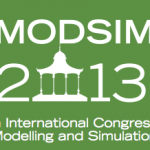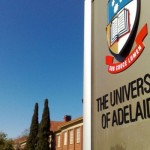A year-long program at the Statistical and Mathematical Sciences Institute, 2014/15. Applications are open for visiting positions at SAMSI, and will be posted in due course for the workshops.
Category Archives: Ecology

We are pleased to announce that the 20th International Congress on Modelling and Simulation (MODSIM2013) will be held at the Adelaide Convention Centre in Adelaide, South Australia, from Sunday 1 to Friday 6 December 2013. ASOR (the Australian Society for Operations Research) and … Continue reading

BioInfoSummer is a major annual bioinformatics educational and outreach event in Australia, bringing together in excess of 150 biologists, statisticians and bioinformatics professionals. Bioinformatics creates biological information and knowledge by the acquisition, archiving, integration, analysis and interpretation of biological data. … Continue reading
On November 12, 13 and 15, we are organizing the so-called Biomath days to which we invite students from the third grade of secondary school. On each of these days, the participating students will get in touch with the world … Continue reading
The Department of Mathematical Modelling, Statistics and Bioinformatics, Faculty of Bioscience Engineering, Ghent University, has seized the worldwide MPE initiative to illustrate the merits of clinging to a mathematical viewpoint within those domains of science that pursue deeper insights into … Continue reading
This workshop brings together mathematicians and statisticians, whose research expertise is relevant to investigating threshold behaviour in complex environmental systems, with the climate scientists and ecologists who exploit mathematical modelling in their research on tipping phenomena.
Teach Networks to Teenagers
This is an article about outreach efforts to teach networks to students of age 13-16 in England. Supplementary teaching materials are available, too. Link to the abstract and article Download supplementary materials (.zip file)
Convection driven by gravitational instability is a widespread phenomenon in the geophysical fluid dynamics, dynamics of stars and planetary interiors. In contrast to the quasi-homogeneous small-scale turbulence, convection is distinguished by the cell-like coherent structure of the flow. Absence of … Continue reading
Victor Donnay: Ordinary Differential Equations in Real World Situations
This course for junior and senior math majors uses mathematics from ordinary differential equations, to analyze and understand a variety of real-world problems. Among the civic problems explored are specific instances of population growth and over-population, over-use of natural resources … Continue reading
CliMathNet Conference 2013 Continue reading

IIASA’s annual 3-month Young Scientists Summer Program (YSSP) offers research opportunities to talented young researchers whose interests correspond with IIASA’s ongoing research on issues of global environmental, economic and social change. From June through August accepted participants work within the … Continue reading
Creating usable models for the sustainability of ecosystems has many mathematical challenges. Ecosystems are complex because they involve multiple interactions among organisms and between organisms and the physical environment, at multiple spatial and temporal scales, and with multiple feedback loops … Continue reading
Tom Pfaff’s Sustainability Materials for Mathematics
Materials are available for mathematics courses (mostly Calculus I, Statistics, & Differential Equations) covering a variety of sustainability related topics. Tom Pfaff’s Sustainability Materials Sustainability Math Resources Website
This is part of a series of workshops organized by IMPA aiming at bringing together a multidisciplinary group of scientists to study problems in the biophysical sciences upon which mathematics may have an impact. This year’s main topics are: Inverse … Continue reading
We all know something about waves; we’ve seen them in the sea and as ripples on a pond. We know that sound travels to our ears as a wave and that some properties of light can be explained by its … Continue reading
MCRN Mathematics and Climate Annotated Reading Lists
MCRN Annotated reading lists: Each reading list is designed to provide an introductory guide to one area of climate science through its literature. They can be used for independent study, or as the foundation for upper division and graduate reading courses. … Continue reading
DIMACS Sustainability Modules for Core Math Classes
Coming Soon: modules on math and sustainability topics, developed with NSF funding at the Center for Discrete Mathematics and Theoretical Computer Science (DIMACS) in collaboration with the Mathematics and Climate Research Network. Modules are targeted to core curriculum college mathematics … Continue reading
The thematic program “Mathematical Biology” will be held in Lyon from March 4th to June 14th, 2013. The main topics to be addressed in this program are: cell biology, population dynamics, quantitative modeling for drug development, systems biology, and evolutionary … Continue reading
The main topics to be highlighted during the workshop are mathematical models for evolutionary biology (deterministic models and stochastic processes) adaptive dynamics modeling of invasive species Recent progresses have been made in the modeling of biological invasions and evolution, from … Continue reading
Ecologists and statisticians have much to gain from working together Continue reading
THE ROLE OF MOVEMENT AND DISPERSAL IN SPATIAL ECOLOGY, EPIDEMIOLOGY AND ENVIRONMENTAL SCIENCE Continue reading
The Canadian landscape is dotted with thousands of lakes, mighty rivers and uncountable streams run through it, and three oceans border it. Continue reading
Climate change is a significant and emerging threat to public health, and changes the way we must look at protecting vulnerable populations. Continue reading
In epidemiology and ecology, models are typically developed along one of two directions: directly from available data, incorporating as much empirical records as possible, or conceptually as dynamical systems, incorporating data via estimation of parameters. Continue reading
The issues outlined are broad and important, but initially progress must be made on more specific questions
that can be defined in ways amenable to mathematical treatments. The purpose of this BIRS workshop is to
generate, develop and apply new tools for the analysis of invasions and population distributions under
environmental change. Continue reading
We propose to bring together ecologists and mathematicians with expertise in cyclic populations to discuss recent advances in our theoretical understanding of the causes and implications of population cycles from both the ecological and mathematical points of view. Continue reading